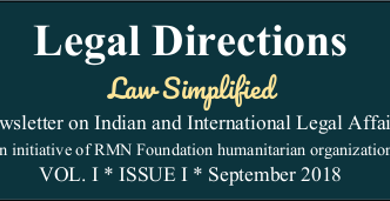Why Lawyers Must Come Under Consumer Protection Act

The government must create robust public grievances systems where the consumers of legal services could register their complaints effortlessly against the lawyers and law firms.
By Rakesh Raman
India’s Minister of Consumer Affairs Ram Vilas Paswan said Friday that there is no proposal to include legal services in the rules being framed under the Consumer Protection Act, 2019.
He was responding to the apprehension expressed by Bar Council of Delhi and the Bar Council of India regarding the inclusion of legal services in the Consumer Protection Act, which is supposed to protect the interests of consumers in India.
The minister said that at present, there is no proposal to amend the definition of ‘services’ in the Consumer Protection Act, 2019, adding that if the representatives of the Bar Councils want any further clarification, they can meet the minister on Monday, 16th March, 2020.
I would like to clarify that there is no proposal to include legal services in the rules being framed under the Act. Further at present, there is no proposal to amend the definition of ‘services’ in the Consumer Protection Act, 2019. 3/4 @barcouncilindia
— Ram Vilas Paswan (@irvpaswan) March 13, 2020
As the advocates had threatened to protest if their services are brought under the consumer protection law, the minister succumbed to their threats. However, the minister’s decision is utterly wrong.
In fact, there is an urgent need to safeguard the litigants’ interests because most lawyers are dishonest who are openly fleecing their clients.
| “Most lawyers and judges in India are working in a totally free-wheeling manner with limited knowledge of law and limited English language skills.“ |
As I have been running an international editorial publication Legal Directions, I have to interact with dozens of people in the legal profession – including law students, lawyers, law teachers, judges, and others.
I have observed that most lawyers and judges in India are working in a totally free-wheeling manner with limited knowledge of law and limited English language skills. The entire Indian judiciary is functioning on serendipity or luck of the litigants.
The court cases are hardly decided on their merits. Instead of dealing with a case objectively, the judges use their whims to decide a case while the lawyers keep giving random justifications for the lost cases. The less said about the Indian courts, the better.
I have also experienced that almost all the lawyers are either so naive that they do not even understand their own profession or they are crooks who rob their clients. Since clients have hardly any knowledge of their own cases, they get cheated by the lawyers.
This is the reason that most people prefer to stay away from courts and lawyers. In fact, it may be easier for you to deal with a black ghost rather than dealing with a dishonest lawyer. Dishonesty is so rampant in the Indian legal profession that it is often said that it is more lucrative for a lawyer to lose a case than to win it.
| “Dishonesty is so rampant in the Indian legal profession that it is often said that it is more lucrative for a lawyer to lose a case than to win it.“ |
Lawyers take hefty money from the clients in advance by giving them false assurances that their case is very strong. But then they deliberately delay the cases to have more hearings so that they could loot the clients by taking fee for each hearing. As judges are part of this ugly scheme, they keep giving adjournments even when the case can be decided instantly.
Some lawyers force their clients to pay hundreds of thousands of rupees for appearing only for a few seconds in the courtroom to get a new hearing date. If the client tries to reason, the greedy lawyers threaten to abandon the case midway. As clients are trapped, they have no other alternative but to succumb under the lawyers’ extortion threats.
| “Some lawyers are so foolish that they do not even change the names of places or courts while copying content from other documents.“ |
Since most lawyers have no writing skills, they steal content from other legal documents to make very weak and flimsy petitions or replies which have all types of mistakes in them. While I regularly read all such flawed court documents, some lawyers are so foolish that they do not even change the names of places or courts while copying content from other documents. With such bad and unethical work, they demand huge money from their clients like legal vultures.
With lifted / stolen content, the lawyers try to make very bulky petitions with utterly useless annexures to impress their clients in order to grab more money from them. While clients do not understand the lawyers’ dirty tricks, the careless judges dismiss such petitions without reading even a few sentences in them. But in all this deception of the legal system, the poor clients suffer.
Worse, most lawyers do not reveal their fee and other charges in the beginning while taking the case. Once the case begins, they start demanding more money from the clients with the subtle threats to spoil their cases.
| “The individual lawyers as well as law firms must be asked to publicly announce through websites their fee structures and the processes that they follow to provide their services.“ |
The lawyers argue that they should not be brought under Consumer Protection Act or taxed for their services because they are offering their skills to the litigants. This is an absurd argument. You will be surprised to know that most lawyers do not have any skills, as they cannot even write petitions or other court documents properly and they cannot speak correctly in front of a judge.
While most lawyers work in an irresponsible manner, there is no accountability for them. You will lose your court case, and you will not be able to complain about it. In order to protect the clients from this vulnerability, the Consumer Protection Act must cover the legal services.
Another argument given by the dishonest lawyers is that they cannot advertise to market their services. However, the truth is that many lawyers and law firms advertise their services through comprehensive websites. But they are so deceitful that they do not divulge their fee and other charges through the websites. Thus, they not only cheat their clients, but they also evade taxes that they must pay.
| “Lawyers must be designated as commercial Legal Service Providers (LSPs) with properly regulated fee structure for them.“ |
In fact, the individual lawyers as well as law firms must be asked to publicly announce through websites their fee structures and the processes that they follow to provide their services. In order to bring transparency to the system and hold lawyers accountable, it should be made mandatory for lawyers to have their website in a regulated format.
Moreover, under the amended Consumer Protection Act or similar legislation, lawyers must be designated as commercial Legal Service Providers (LSPs) with properly regulated fee structure for them so that they should not fleece the clients randomly. They should also pay full taxes on their income.
More importantly, the government must create robust online and physical public grievances systems where the consumers of legal services could register their complaints effortlessly against the lawyers and law firms so that the dishonest lawyers could be removed from the legal profession.
By Rakesh Raman, who is a national award-winning journalist and social activist. He is the founder of a humanitarian organization RMN Foundation which is working in diverse areas to help the disadvantaged and distressed people in the society. He also creates and publishes a number of digital publications and research reports on different subjects.




